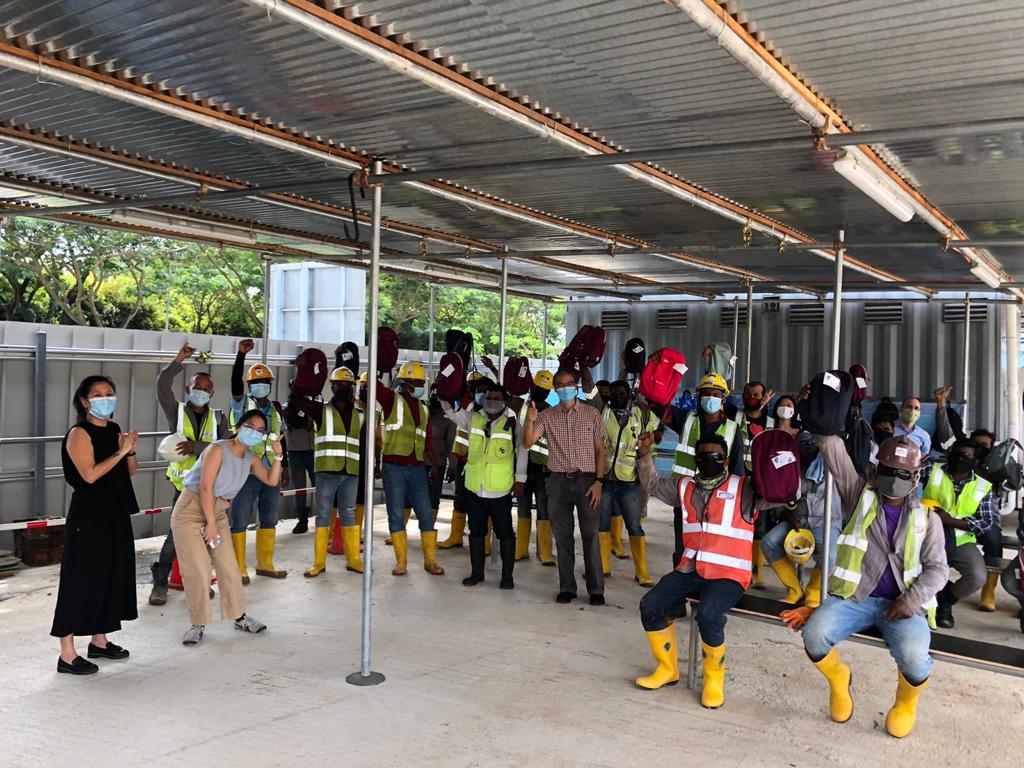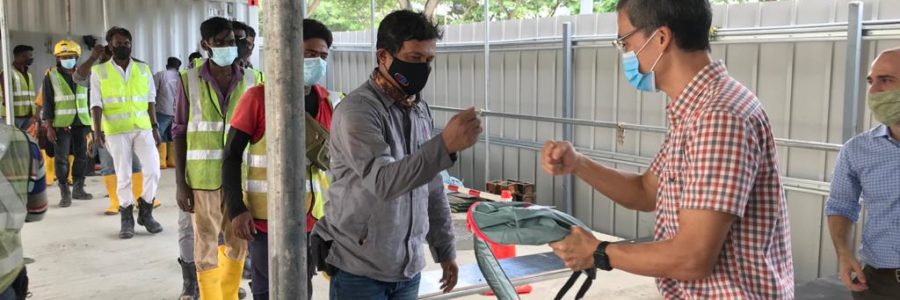BY NAOMI WANG
When COVID-19 hit migrant worker dormitories in March 2020, the APC community quickly responded and raised over S$600,000 over three days to support emergency relief efforts migrant worker NGOs were conducting on the ground. However, the impact-driven attitudes of some members led to further questioning of the broader issues facing migrant workers at the systems-level, and the possible solutions to address them: Why do migrant workers in Singapore occupy such vulnerable and disempowered positions? How can they be enabled to thrive in the longer term?
With these questions in mind, the APC team set out to explore potential avenues for involvement. After several meeting and discussions on possibilities, APC members decided to support a feasibility study to assess an “Employer Certification Scheme (ECS)”—an industry-level strategy requiring corporate stakeholders to publicly align with a set of defined and verifiable standards.
Sector experts suggested that the standards of an ECS should pertain to the recruitment and employment terms of migrant workers—commonly identified as the most pressing structural issues, with debt bondage-like conditions endured by a large proportion of workers given little choice.
The APC team undertook a challenging, albeit rewarding, study over the course of four months, delving into the world of migration, cross-border recruitment, labour rights, and corporate compliance, interviewing close to 30 participants across the private, public, and non-profit sectors.
Initial Findings
One of the most striking early discoveries was the sheer complexity and opacity of the migrant labour recruitment ecosystem. Sector experts helped the APC team to grasp the peculiar dynamics of these transnational networks, which involve multiple stakeholders across both the workers’ countries of origin and the host country (e.g. Singapore).
As the APC team spoke to NGOs in the ethical recruitment space, as well as to recruitment agents, the immense challenge of disrupting an entrenched market became very apparent. Given a high number of jobseekers in source countries such as India and Bangladesh, and relatively few jobs in destination countries, it is jobseekers and not employers who bear the bulk if not the entirety of the cost to seek out, prepare for, and secure their jobs. This distorted dynamic is exacerbated by exploitative networks of recruitment agencies and informal sub-agents, which often take advantage of jobseekers in the form of excessive fees, kickbacks, and salary deductions.
In light of these complex, stubborn dynamics that dictate markets both in Singapore and abroad, can an industry-level ECS could truly impact the recruitment ecosystem? International NGOs and funders with experience in tackling human trafficking in supply chains assured that such industry action, while difficult, would still be a worthwhile endeavour.

Industry players, especially those at the apex of their supply chains, play the crucial role of setting the principles and standards of ethical practices, thereby creating business incentives for stakeholders further down the supply chain to demonstrate efforts towards compliance accordingly.
Private sector action would also indicate to government stakeholders a readiness for further policy engagement around these issues. Local NGOs and direct employers of migrant workers particularly stressed the importance of government support and eventual involvement in an ECS strategy, pointing to specific policies that set terms of recruitment and employment conditions. Others also emphasised the possibility of government procurement in migrant worker-heavy sectors, such as construction, to promote the adoption of an ECS.
Over the course of the research process, the APC team was able to share the ECS proposal with a government agency, who were indicatively supportive of the strategy, and was keen to be updated on further developments.
Though an ECS strategy held up conceptually, the practicalities of developing and implementing such a scheme present a separate set of considerations. What incentives are there beyond the moral imperative for industry players to sign on to an ECS? How long would it take to build a coalition of willing stakeholders to take an ECS forward?
Those with experience in developing certification and compliance systems advised that it would take years to build up a robust certification ecosystem with sufficient support from stakeholders across multiple sectors to ultimately effect market change. Some suggested first developing a slimmed-down Code of Conduct to be later fleshed out with necessary training, transparency, and accountability mechanisms before eventually evolving into a full-fledged certification scheme.
It was this phased approach to certification that the APC team recommended to members as the most feasible way forward. Taking a gradual approach would allow morally-motivated early adopters to participate in the co-creation of a Code of Conduct and provide ample time to socialise the initiative amongst the public, private, and social sectors to progressively gather support and gain momentum for an ECS.
Next steps
Following the final report and ensuing discussions, APC is excited to share that its members have decided to support the next phase of development for an ECS. APC is currently looking for a suitable individual to lead and drive the activities moving forward.
APC thanks all interview respondents whose time, insights, and expertise have guided the team to this point. We are hopeful in the potential of an ECS to bring meaningful change for migrant workers and Singapore society at large and welcome you to join us as we continue this journey.
Stakeholders from relevant industry and social sectors interested in reviewing a copy of the research report and/or exploring areas of collaboration may get in touch with Jiaxin Xu at [email protected].

